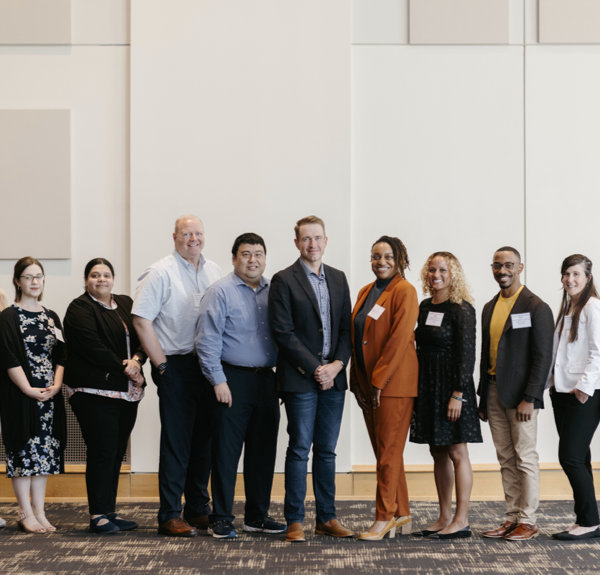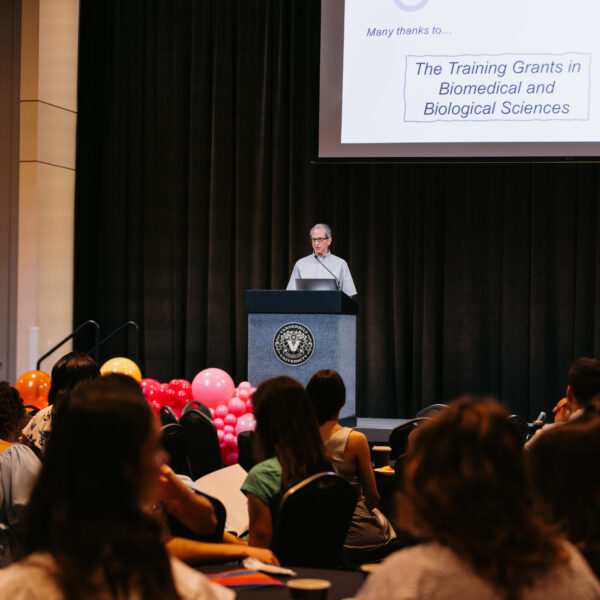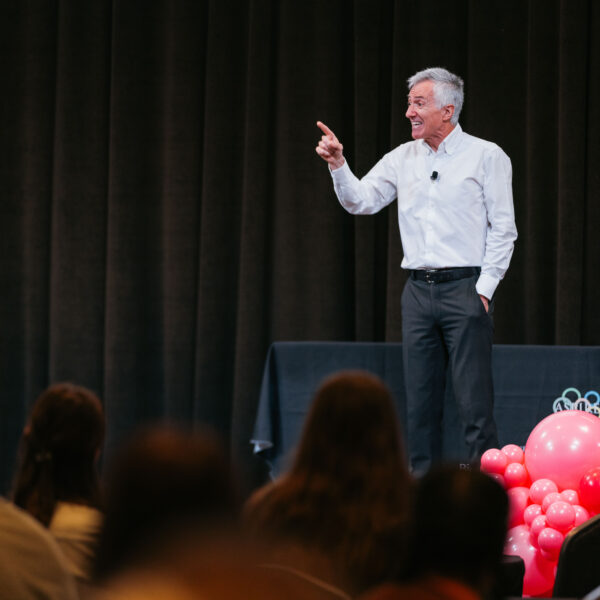 On May 31, the Office of Biomedical Research Education and Training’s ASPIRE Program hosted its yearly career symposium, bringing together biomedical science professionals, including basic sciences alums, to speak about their jobs and share their diverse career pathways with more than 200 attending biomedical graduate students and postdoctoral fellows. This year’s theme, “A Kaleidoscope of Biomedical Science Careers,” emphasized the variety of roles available to trainees once they complete their training, from research and academia to industry and government.
On May 31, the Office of Biomedical Research Education and Training’s ASPIRE Program hosted its yearly career symposium, bringing together biomedical science professionals, including basic sciences alums, to speak about their jobs and share their diverse career pathways with more than 200 attending biomedical graduate students and postdoctoral fellows. This year’s theme, “A Kaleidoscope of Biomedical Science Careers,” emphasized the variety of roles available to trainees once they complete their training, from research and academia to industry and government.
“The ASPIRE Annual Career Symposium is an excellent opportunity for our trainees to explore careers and has proven particularly effective because they hear from former graduates of our own Ph.D. training programs,” Walter Chazin, senior associate dean of BRET, said. “The fact that we have so many alumni who are highly motivated to come back to campus to share their stories and network is a powerful testament to the success of our graduate training in the biomedical sciences.”
Every year, BRET brings back a handful of alums to discuss career opportunities for biomedical sciences Ph.D.’s and the diverse landscape of biomedical careers with current trainees.
“Our Ph.D. and postdoctoral alumni go on to become leaders in many spheres, both in and beyond academia,” Kim Petrie, director of the ASPIRE program. “If a typical Ph.D. student connects with career symposia during each of their five years in grad school, they can build their professional network by 50–60 people!”
This year, alum speakers included:
- Amrita Banerjee, cell and developmental biology graduate, currently a foreign affairs officer at the U.S. State Department, Bureau of International Organization Affairs
- Emily Turner, psychological sciences graduate, currently a senior manager of medical writing at Xenon Pharmaceuticals
- Eric Johnson, pharmacology graduate, currently the executive director of discovery science at Initial Therapeutics
- Isaac Zike, pharmacology graduate, currently the managing director at RiverVest Venture Partners
- Karissa Culbreath, microbiology and immunology graduate, currently medical director and division chief of infectious diseases at Tricore
- Keely Solomon, former cell and developmental biology postdoctoral fellow, currently a senior medical director at Agios Pharmaceuticals
- Kristin Burnum-Johnson, biochemistry graduate, currently a science group leader for functional and systems biology at Pacific Northwest National Laboratory
- Meagan Quinlan, pharmacology graduate, currently a therapeutic lead on the adeno-associated virus gene therapy team in the human cell types group at the Allen Institute
- Tony Chen, cell and developmental biology graduate, currently a publisher in the npj journal series at Springer Nature
 In addition to these alum speakers, the opening keynote talk was given by communications expert Jean-Luc Doumont, whose background is in engineering and applied physics. Currently, Doumont trains researchers, engineers, managers, and other professionals to effectively communicate, think critically, and enhance other professional development skills.
In addition to these alum speakers, the opening keynote talk was given by communications expert Jean-Luc Doumont, whose background is in engineering and applied physics. Currently, Doumont trains researchers, engineers, managers, and other professionals to effectively communicate, think critically, and enhance other professional development skills.
“It was refreshing to hear a talk with practical advice from a trained scientist!” Cherie Saffold, graduate student in the molecular pathology and immunology graduate program, said.
In tandem with the day’s talks, symposium participants engaged in dynamic networking sessions and discussions on topics ranging from effective communication and grant writing to navigating the job market and developing a personal brand. One hands-on workshop, “How to Network,” was designed to help attendees build skills necessary for successful careers.
“Networking is a skill, and no one has ever taught me how to do it,” Saffold said. “[In the workshop], I felt like I learned some concrete step to practice and improve my networking skills.”
Like Saffold, many attendees left the day with valuable connections and insights that could lead to future collaborations and career advancements.
2024 Career Symposium Planning Sponsors:
- Biochemical and Chemical Training for Cancer Research
- Cellular, Biochemical and Molecular Sciences Training Program
- Chemical Biology of Infectious Diseases (CBID)
- Chemistry-Biology Interface
- Genetic Variation and Human Phenotypes Training Program
- Immunological Mechanisms of Disease training program
- Initiative for Maximizing Student Development (IMSD)
- Interdisciplinary Training in Rheumatic Diseases
- Microenvironmental Influences in Cancer
- Molecular Biophysics Training Grant at Vanderbilt
- Multidisciplinary Training in Molecular Endocrinology
- Postdoctoral Program in Functional Neurogenomics
- Program in Developmental Biology
- Project REACH: Research Expertise and Training in Children with Hearing Loss
- Translational Interdisciplinary Research Training in Communication Sciences and Disorders
- Training in Fundamental Neuroscience
- Training in Pharmacological Sciences
- Training Program in Environmental Toxicology
- Vanderbilt Biomedical Informatics Training Program